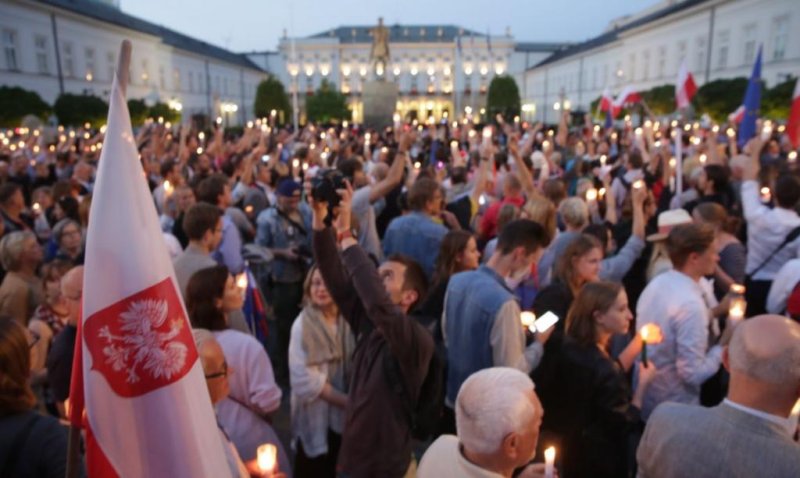Demonstrators mass in the plaza of Warsaw's presidential palace on Wednesday to protest a bill in parliament designed to weaken Poland's judicial branch. Photo by Thomasz Gzell/EPA
July 21 (UPI) -- Poland's parliament is set to pass sweeping changes Friday to its judicial branch which will consolidate power in the governing political party, the European Union warned.
The country is on a rightward tilt. The opposition, shut out of the legislative process, organized demonstrations during the week. It massed 100,000 protesters in protests in major cities across the country on Thursday, with more planned for Friday. The EU has said Poland, an EU member, risks ostracism in its step away from democracy.
The far-right Law & Justice Party, which controls both houses of parliament, passed a bill in the lower house forcing Poland's 83 top judges to resign, giving the governing party control over their replacement. The bill will be voted on in the upper house on Friday and is expected to pass.
The country's Supreme Court rules on, among other criminal and civil matters, the legitimacy of elections. The proposed law makes judicial appointments and decisions dependent on the party in power, a violation of democracy's separation of government powers. Donald Tusk, European Council president and former Polish prime minster, said the bill would reverse decades of progress and pull Poland "backwards and eastwards," a reference to the era of Soviet influence.
"We are concerned about the Polish government's continued pursuit of legislation that appears to limit the judiciary and potentially weaken the rule of law," U.S. State Department spokeswoman Heather Nauert commented.
While the bill is considered, the demonstrations continue and the value of the zloty, Poland's currency, has fallen on world trading markets.
Polish Prime Minister Andrzej Duda has refused to meet with Tusk to discuss the crisis. Tusk suggested Thursday they meet to avoid "a black scenario in which Poland is marginalized in the EU."
Under consideration by the EU is a triggering of Article 7, a sanction, never before used, which would suspend Poland's EU voting rights.
"Recent measures taken by the Polish authorities on the judicial system greatly amplify the threat to the rule of law in Poland," European Commission Vice President Frans Timmermans said Wednesday.















